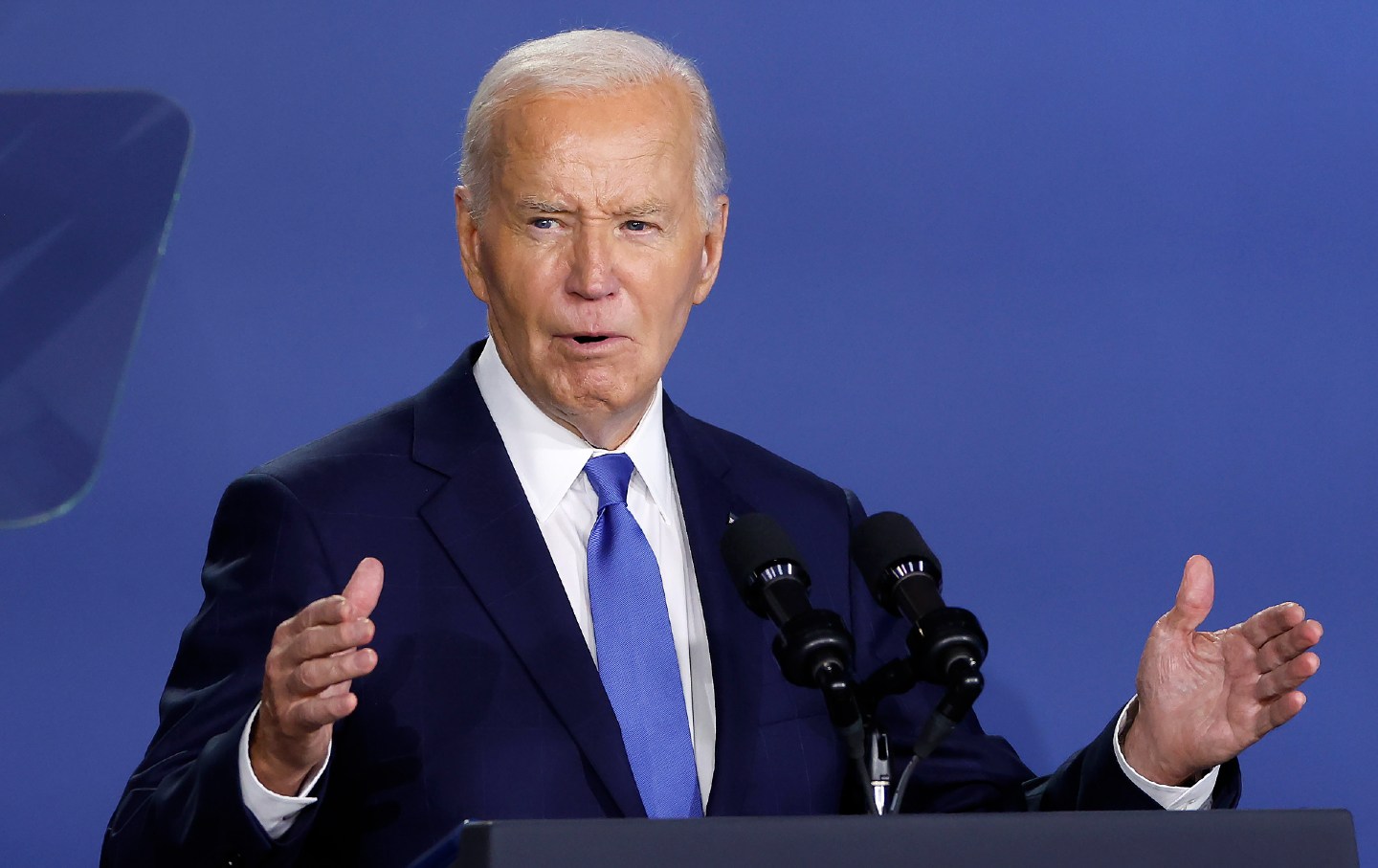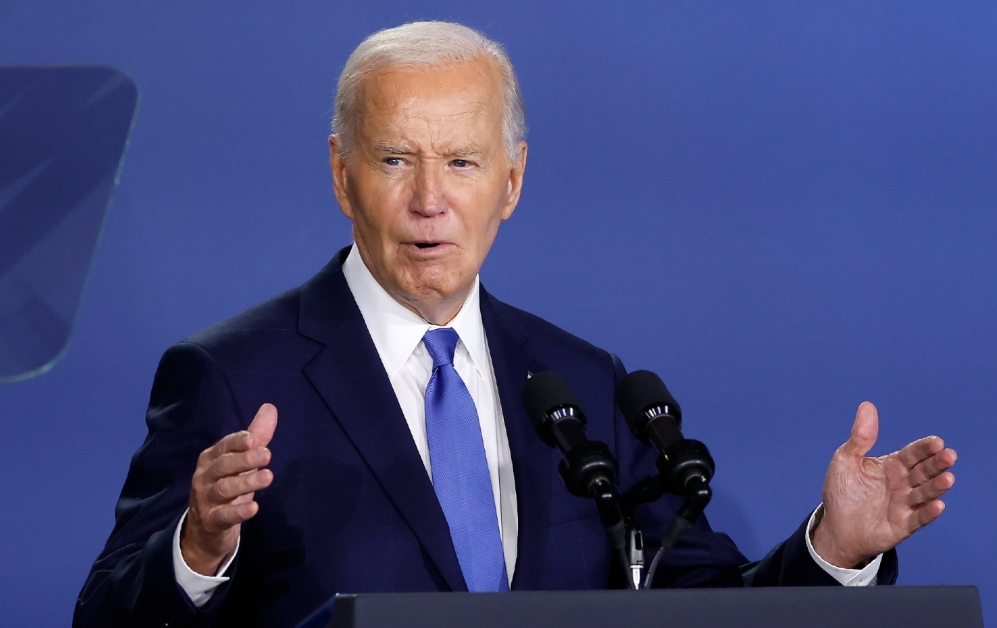The Democrats have a winning election message—but do they have the right messenger?

If elections were decided by simple factual measures of whether the public is better off due to an incumbent’s policies, Joe Biden would be sailing smoothly into a landslide in November. Just in the past week, there was a spate of data showing that the economy is booming and crime is steeply declining—thus depriving Donald Trump of two of his important talking points. At least to voters who care about evidence.
Robust job growth under Biden’s watch has led to substantial real gains for the working class. On Thursday, Axios reported, “Just 13% of workers in the U.S. are now earning less than $15 an hour; two years ago, that number was 31.9%, per new data from Oxfam.” The same day, The Washington Post reported, “Inflation eased more than expected in June, handing Federal Reserve officials another dose of encouraging data as they inch closer to cutting interest rates and giving long-awaited relief to households and businesses.”
On Monday, CNN reported, “Violent crime dropped by more than 15% in the United States during the first three months of 2024, according to statistics released Monday by the FBI…. The new FBI figures validate a trend identified by some national crime experts: The US murder rate continues to drop at a high rate and could be headed for its largest annual decline ever.”
In theory, all of this should bolster the case for Biden. During last month’s presidential debate, Trump kept harping on how both crime and inflation were out of control. At one point, the former president said, “inflation’s killing our country. It is absolutely killing us.”
But in politics, facts alone don’t win arguments. Facts persuade only when they are adeptly presented as part of a political argument. Biden’s lagging performance in polls, something that has remained constant for months and has gotten worse after his poor debate performance, is proof that his campaign is failing to persuade. Under Biden, the Democrats have a great message, but a subpar messenger.
On Thursday, Politico writer Sam Stein noted:
The killer for the White House and campaign has to be that there is tons of great/good news that is getting buried right now
Inflation cooling
Voters economic outlooks rising…
Jobs steady
Writing in Semafor, journalist Jordan Weissman made a similar point and offered a good explanation of why the good news isn’t winning Biden more support:
Biden’s camp would surely prefer that his party stop its hand-wringing and instead play up the positive developments in the economy. The question is whether that’s really a feasible strategy, or if Biden’s age has now become the all-encompassing storyline that will define his candidacy. Unfortunately for the president, the latter seems quite probable, given that Republicans are unlikely to let the issue go, and every public appearance he makes will now likely be scrutinized for signs of decline.
Biden partisans, of course, resist this analysis and argue that the media is at fault for giving too much attention to Biden’s age and not enough to the booming economy and the falling crime rate. But this is a pure cop-out. The economic news cited in this column appeared in prominent mainstream media outlets. It’s not the media’s job to turn these facts into polemical weapons for the Democrats. That’s the job of elected officials—Joe Biden most of all.
Biden is, at least in this phase of his career, the exact opposite of a great communicator. Even when he cites his strong economic performance, as he did during the debate, it is hard for audiences to understand what he is saying. His mumbling, halting, digressive—and at times nonsensical—style of speech undermines his own message.
On Thursday, Joe Biden gave a much-noticed press conference. He spoke better than he had during the debate, so much so that some reporters praised Biden’s performance. It is true that on certain issues, notably in support of labor unions, Biden was forceful and impressive. But Biden also faltered at many points.
Conservate Never Trump writer Stephen Hayes, CEO of The Dispatch, was closer to the mark than those who insist Biden gave a knockout rebuttal to skeptics. As Hayes notes:
The president opened his press conference by mistaking VP Harris for Pres Trump. He said he was going to follow the advice of the commander in chief – military chief of staff. He spoke about pacing himself and better managing his schedule to accommodate his challenges. He spoke gibberish about Ukraine’s ability to strike into Russia. He said: “We’re gonna make sure that rents are kept at 5% increase, corporate rents for apartments and the like, homes, are limited to 5%.” Extended non-nonsequitirs [sic] and half-thoughts on Japan, South Korea. And all this just two hours after he introduced Volodmyr Zelensky as Vladimir Putin.
If we think that’s a good night because he also had moments of coherence, even extended ones with substantive answers, we’re not just grading on a curve – we’re nuts.
In other words, Biden remains a deeply flawed communicator even in his best moments. This is the problem Democrats face: Biden can at times sell his achievements—but never consistently enough to make a difference, since when he talks he descends into rambling incoherence frequently enough to remind voters of their worries about his age. Biden has a genuinely impressive domestic record on the economy and social cohesion (which is one reason crime is going down). But he remains the worst possible salesman of his achievements.
Thank you for reading The Nation
We hope you enjoyed the story you just read, just one of the many incisive, deeply-reported articles we publish daily. Now more than ever, we need fearless journalism that shifts the needle on important issues, uncovers malfeasance and corruption, and uplifts voices and perspectives that often go unheard in mainstream media.
Throughout this critical election year and a time of media austerity and renewed campus activism and rising labor organizing, independent journalism that gets to the heart of the matter is more critical than ever before. Donate right now and help us hold the powerful accountable, shine a light on issues that would otherwise be swept under the rug, and build a more just and equitable future.
For nearly 160 years, The Nation has stood for truth, justice, and moral clarity. As a reader-supported publication, we are not beholden to the whims of advertisers or a corporate owner. But it does take financial resources to report on stories that may take weeks or months to properly investigate, thoroughly edit and fact-check articles, and get our stories into the hands of readers.
Donate today and stand with us for a better future. Thank you for being a supporter of independent journalism.
Jeet Heer
Jeet Heer is a national affairs correspondent for The Nation and host of the weekly Nation podcast, The Time of Monsters. He also pens the monthly column “Morbid Symptoms.” The author of In Love with Art: Francoise Mouly’s Adventures in Comics with Art Spiegelman (2013) and Sweet Lechery: Reviews, Essays and Profiles (2014), Heer has written for numerous publications, including The New Yorker, The Paris Review, Virginia Quarterly Review, The American Prospect, The Guardian, The New Republic, and The Boston Globe.




